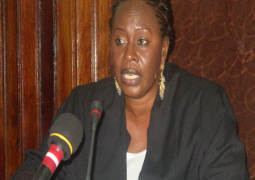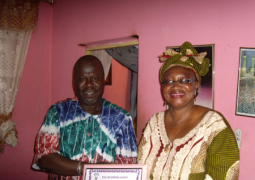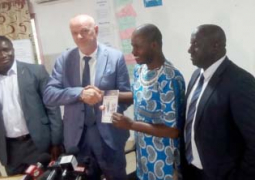The year is 1970. A baby boy is born in a small and remote village, about 200 kilometres from
Fourteen years later, this young man left for
Last week, I met a friend who queried whether the promotional activities of GSM providers in The Gambia, giving out millions of Dalasis in prizes, is in the interest of the investors to maximise their wealth or is it just making some lucky customers rich. The underlying argument is in whose interest should businesses be run?
Fellow Participants, the contention is, is it the responsibility of businesses to help the poor? And what do we mean by helping the poor? Should it be a business's concerns to make customers financially better? Are we talking about a business or moral argument? What happens when profit-maximization and CSR objectives are in conflict? We all know that the theory underpinning the capitalist economy is profit-maximization. But does profit-maximization mean excluding the poor to access finance? Or is it a "conceptualization-failure" that the most practiced economic system- capitalism- should be based on such principles? Some would argue that it is just a matter of interpretation? For many who are impatient, they are demanding for parallel systems?
In this presentation, I will attempt to interrogate some of these questions further and provoke some thoughts on the subject. At the outset, I would like to quote Dr Lenrie Peters, who profess that unless we "turn the practice of thinking into an industry" and become tolerant of divergent views, we would not be prepared for the future. This is crucial in this discussion, because I am thinking aloud here.
In his book, "Creating a World without poverty", Dr Muhammad Yunus, the co-winner of the 2006 Nobel Peace Prize critically argued that capitalism is myopic in its definition of human nature as one-dimensional, that it is concerned only with the pursuit of maximum profit. He reminded us that human beings have multi-dimensional interests from moral, religious to other social needs, that we need new types of businesses to pursue goals other than making money for personal gains. He identified two types of social businesses: businesses for social benefits like NGOs and other charitable activities supported by philanthropists, and the other is profit-maximizing businesses owned by the poor through the support of micro-financing. In
Over the years, we have seen that the conventional NGO's have moved away from this form of assistance, and have ventured into economic empowerment, through participatory approaches. This has spawned a hybrid of social businesses premised on the economic empowerment of communities. How do we adapt these concepts to create profit-maximizing social businesses owned and managed by the poor becomes a relevant topic of discussion.
"Microfinance is the practice of providing banking services to the economically active poor. Microfinance is not charity; rather, it seeks to provide equal access to financial services so that the poor can grow their businesses, insure their families, and begin savings deposit programs. Accordingly, microfinance services can include anything from credit to insurance, which are provided to people on low incomes who run and operate micro_enterprises in developing nations". The principle of micro-credit has been around for some time now, and is almost synonymous with micro-finance. Microcredit has a long history in Asia, dating back to 1976 when the Grameen Bank in
Coming home, the Financial Institutions Act, 2003 of The Gambia has made provisions for non-bank financial institutions that accept deposits and make payments to finance micro-projects. Under this Act, MFI's have been registered and are operating under the supervision of the Central Bank, where a Micro Finance department is responsible for regulating the licensed MFIs.( We should all be excited by the presence of Reliance Financial Services, as it also brings the subject of micro-financing in context under the microscope). This Act has not defined Micro Finance, which would have provided a useful contextual framework.
Therefore let me point out that I am no expert on micro-finance, and wish to start with the acknowledgement of the definitional complexities around the subject. From the development perspective, microfinance is all about giving poor people a chance which they deserve to enable them get out of poverty, to be treated as responsible, productive agents with the capacity to improve their own lives.
This definition links in very neatly with the theme of the conference, which is "the development of micro-finance capability in The Gambia" and taking this definition as our point of departure, we have to conceptualize how to create social-oriented, profit- making businesses owned and managed by the poor. And also to progressively define the necessary legal and institutional frameworks that would accelerate the development of micro-finance capabilities in The Gambia.
The focus of this paper is Micro-finance: Creation of social businesses (micro-enterprises) in the Gambian context and we need not focus too much on an analysis of the impact of credit in other economies. Indeed, it is important to contextualise micro- financing to suit our environment.
Let's take the micro-financing model which relies on group lending to address the problems of non-payments, in a country where lenders do not share borrower information. The group lending model works on the basis that group pressure will encourage members to repay their credits. An imminent challenge is, for example, how does this model works in our market when there are many more MFIs? Defaulting group members can obtain new loans from competing MFIs, and the whole scheme could collapse in an unregulated market with low information sharing. Even where state-run credit bureaus exist, there will still be challenges to its successful operations in remote, rural villages.
The point is that understanding the economic and contextual dynamics is critical to the success of micro-financing. It is important to take note of the variations of micro-finance models around the world accounting for the social and cultural context of the communities it intends to serve. Therefore we should always challenge ourselves to create new and innovative approaches to match the needs of the Gambian economy.
And, I strongly believe that we need to exploit the opportunities of micro-financing to alleviate poverty through the creation of social businesses to revive or enhance the productive sector of the economy. The romanticized view is that micro credit will help poor borrowers to have access to credit; but what is more likely in most poor countries is that, it is used to smooth out consumption. But what the poor need is not more micro-businesses (owned/managed) but small to medium sized enterprises to create more jobs, and guarantee livelihood security. Small to medium sized enterprises are also the real engines of economic growth.
Let's take two examples to illustrate the significance of micro-financing in our context.
In Tanji today, many Gambians are engaged in the fishing sector; for the most part it is hardly to get them out of poverty than to feed their families from the little daily incomes they earn. How do we support these people to be more productive? Some of these people may be only intermediaries between the fishermen and the consumers; and are normally squeezed by the more powerful stakeholders to the extent that their daily incomes can sometimes be completely eroded. And the seasonal variations can also pose significant risks to their daily incomes.
Participants, let's take another example: The Bakau Gardens at Mile Seven. The Gardens have been in existence for so long, owned and managed by the Bakau community. For how long have they been doing this at subsistence level? I do not have precise details about the
In context, it is essential that micro financing drives aggregation, expansion and promotes diversification into more productive activities. It should not encourage over concentration of business activities operating at very subsistence levels. Let me underscore that, what
In the case of Tanji, for example, MFIs can support the establishment of a business entity, where the MFIs would provide business advisory support and equity funds, in partnership with the economically active poor. Such partnerships would require the participation of the MFIs to assist them to set up these new business entities and to take part in their management. Take for example, the financing of 20 fishing canoes through partnership with these women. The interesting thing is that these ideas could be fine tuned in consultation with the local participants so as to allow them to take equity ownership and management control, in partnership with the MFIs. I am sure at this juncture; some would raise eyebrows, in respect of the risk of investing in such ventures. I will attempt to address these concerns later.
My proposition is that profit-maximizing social business model is what is required for two reasons. It does not only get the poor out of poverty but it enhances their business skills to take up further entrepreneurial challenges. How do we create such kind of social businesses? This undoubtedly requires in-depth conceptual discussions among all the stakeholders including the Financiers, the economically active poor, and regulators. The issues would continue to be lack of collateral, lack of managerial skills and the high costs of financing business plans. Moreover, without proper accounting records, many businesses are not capable of preparing business plans acceptable to the banks.
I contend that the establishment of private equity funds is necessary to circumvent the conventional bank-client relationships dilemma in respect of the poor. The main challenges are the high cost of funds and the lack of "bankable business proposals". Therefore what is needed is some kind of intermediation to also provide managerial skills and the comfort needed to invest in social businesses. I reckon that SPECIAL Venture Capital Funds are suitable vehicles to bridge the gap.
Let us deconstruct what I mean by Private equity. Definitions differ and it could mean the entire asset class of equity investments that are not quoted. However in this paper, the term is used to mean private equity class of investments in the form of venture capital funds. A Venture Capital Fund would invest in start-up businesses, are involved in the generation of business ideas, corporate structuring and the management of new businesses with a clear exit strategy. At this point, I am not concerned about the legal and regulatory obstacles to form such kinds of financial intermediation. For I have no doubt that the Central Bank should be well positioned to address those constraints and is working to improve the legal and regulatory environment for the financial sector.
How can we create Special Venture Capital Fund to support the poor? The first question, obviously, would be where the money would come from. The Government, International Financial Institutions, MFIs and high net worth individuals should be encouraged to provide seed capital to establish these funds. I have no doubt that MFIs and private individuals interested in helping the poor would be willing to contribute under special terms to cushion the expected internal rate of returns on these funds. The suggestion is to follow some clear guidelines to generate and evaluate business ideas which would be inclusively aimed at engaging the poor in the productive sector of the economy, identify the most suitable management structures to run the businesses but with strong emphasis to transfer, over time, the business ownership to these communities. So the Fund will make investments, create value and then exit. More significantly these investments should be structured in ways in which the exit strategy gives the communities the first refusal option to buy the fund's equity investment. In a typical early-stage company, the venture capital Fund Managers will work closely with the entrepreneurs, providing not just finance but also mentoring, access to networks, business disciplines, support services and so on.
The detail of such a financing model obviously requires a more detailed analysis and evaluation. That is why I am thinking aloud. It is critical now that concrete steps are taken to address the problems of accessing finance to support the economically active poor. There are obviously no shortage of ideas, the challenge is how to translate them into profitable business ventures. In some developing countries such as in Latin America and the
Finally, Fellow participants, it is true that businesses do not have conscience (people do), and there is an efficiency argument that capitalism is good. That is to say that capital should go only to where it generates the highest returns. This is predicated on functioning institutional and legal frameworks, and in most developing countries these are so ill-defined that companies may take their wealth-maximising objectives to the extent that it widens the gap between the rich and the poor.
But the extent to which we can apply micro financing instruments as a development tool, particularly targeting the poor, depends very much on becoming more innovative, but more importantly to put it into the context of our social, cultural and economic circumstances. If, and when we do that, the capabilities of micro finance to lift more people out of poverty and also serve as an engine of economic development could be achieved sooner rather than later.
To complete the quotation I made earlier, Dr Lenrie Peters, advised "we must be prepared to listen to other points of view, and absorb unusual, new and unexpected ideas" Dr Yunus Muhammad was always thinking aloud. I believe we will continue the thinking process...interestingly both Milton Friedman and Dr Muhammad Yunus are Nobel laureates.
Thank you all for your attention.
This paper was presented by Mr. Katim Touray, CEO/Managing Partner, Real Time Consulting, Old Jeshwang,
Real Time consulting provides financial management and legal advisory services to small and medium enterprises.





